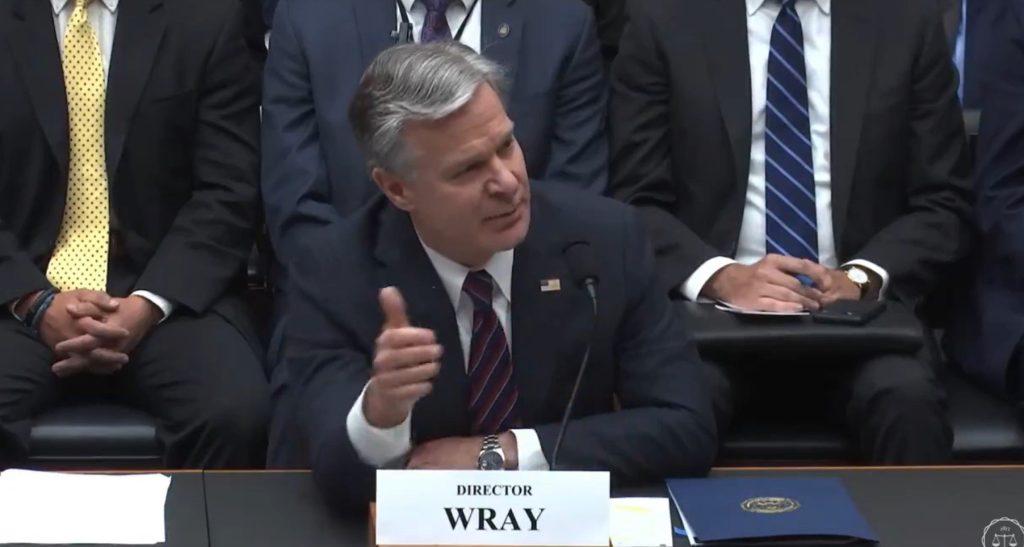Recent revelations have once again spotlighted the actions of FBI Director Chris Wray, as he admitted to Congress that the agency is not probing an incident involving President Trump. This incident saw Trump sharing a stage with an individual identified as a suspect, armed with a gun, at a rally. The lack of investigation raises questions about the priorities of the bureau under Wray’s leadership.
In 2017, a Democrat whistleblower revealed to the FBI that Congressman Adam Schiff approved leaking classified documents intended to damage Trump. This whistleblower reiterated in 2023 that he was present at a meeting where Schiff authorized the leak. Despite this, the FBI, including its leadership, has not taken action.
Chris Wray’s tenure has been marred by numerous controversies, with critics pointing to a pattern of negligence and misconduct. The FBI’s handling of election fraud allegations in Michigan in 2020 is one such example. Despite evidence of fraudulent ballot registrations, no charges were pursued against those involved.
Another scandal involved the alleged kidnapping plot against Michigan Governor Gretchen Whitmer. The case fell apart when it was revealed that FBI informants played a significant role in orchestrating the plot. The accused were acquitted, shedding light on questionable tactics used by the agency.
Wray has also faced scrutiny over the FBI’s presence during the January 6 Capitol protests. Reports indicate that multiple informants were embedded within the protest groups, raising issues about the bureau’s transparency. These revelations have fueled further distrust in the agency’s operations.
The controversy extends to Wray’s alleged participation in investigations targeting political figures. His use of Agent Brian Auten to investigate Mar-a-Lago, after suppressing information about Hunter Biden’s laptop, is just one instance. Critics argue that these actions undermine the FBI’s credibility.
Steve Bannon’s public outburst against Wray and former Attorney General Bill Barr highlights the tension surrounding these investigations. Bannon accused the FBI of withholding evidence related to alleged Biden family crimes. His legal team has even claimed that the FBI secretly spied on Bannon’s defense attorney.
The FBI’s focus on individuals involved in the January 6 protests, while allegedly ignoring other significant threats, has drawn criticism. The agency’s decision to target minor participants, such as a grandmother who walked through the Capitol, contrasts with its handling of other cases. Meanwhile, crimes associated with high-profile figures seem to be overlooked.
Questions about the FBI’s integrity have been raised due to its handling of the Hunter Biden laptop case. Despite seizing the computer in 2019, the bureau did not pursue charges against the Biden family. This inaction has been perceived as a deliberate attempt to shield influential figures.
Wray’s role in these controversies has not gone unnoticed. A series of revelations have painted the FBI as an organization struggling with ethical and operational challenges. These issues have led to a serious decline in public trust in the institution.
The Director’s alleged complicity in political maneuvers during the 2020 election has been particularly damaging. Accusations that he helped the Biden family gain an advantage have sparked outrage among conservative circles. This perception of bias has only deepened the divide between the FBI and its critics.
As these issues continue to unfold, the future of the FBI remains uncertain. Calls for accountability have grown louder, with demands for a thorough investigation into the bureau’s practices. However, whether these calls will result in meaningful change remains to be seen.
The departure of Chris Wray from the FBI marks the end of a contentious era. Observers are left questioning the long-term impact of his leadership on the agency’s reputation. The legacy he leaves behind is one of controversy and debate.
With Wray’s exit, the FBI faces the challenge of rebuilding trust with the American public. The path to restoring credibility will require significant reforms and transparency. Only then can the bureau hope to regain its standing as an impartial enforcer of the law.
As the dust settles on Wray’s tenure, the focus shifts to the future leadership of the FBI. The next director will inherit an agency in need of direction and reform. The task ahead is daunting but necessary for the agency’s survival.
The scrutiny surrounding Wray’s actions serves as a reminder of the importance of accountability in public institutions. Ensuring that leaders are held responsible for their actions is crucial for maintaining democratic integrity. The ongoing debates about the FBI highlight this fundamental principle.
Ultimately, the controversies of the past few years have underscored the need for vigilance and reform. The lessons learned from these events should guide future efforts to strengthen the FBI’s role in serving the nation. Only through commitment to ethical standards can the agency hope to move forward.




2 Comments
Wray Bubbas going to have a lot of fresh meat in prison really soon. You also should get fitted for dentures if you are going to eat prison food you will need teeth not gums to chew. Stock up on KY jelly.
WTF are the ARRESTS?